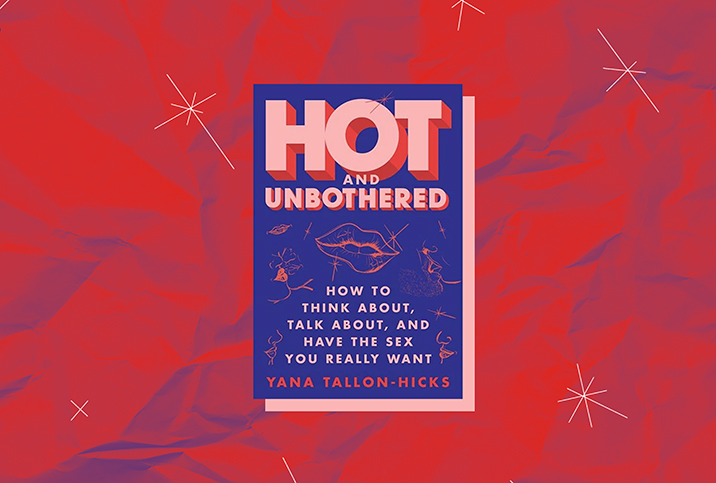Between the Pages: 'Hot and Unbothered' Dispels Pleasure Pessimism

Sex therapist Yana Tallon-Hicks, M.A., wants you to talk about sex more. Her new book, "Hot and Unbothered: How to Think About, Talk About and Have the Sex You Really Want," gives you permission to discuss and think about the topic more openly, as well as strives to empower you to achieve the pleasure you want in the bedroom.
Tallon-Hicks is a sexuality writer, couples and relationship therapist, and an educator based in Western Massachusetts. In "Hot and Unbothered," she dispels myths about the unattainable ideals around "good sex." Through worksheets and exercises, Tallon-Hicks attempts to help the reader identify their own sexual desires and fears, and build a safe space where they can have fulfilling sexual experiences with their partner.
In this exclusive interview with Giddy, Tallon-Hicks discusses the problems with sex education, "pleasure pessimism" and more.
What inspired you to write this book?
Tallon-Hicks: I like to say the short answer to this question is: growing up as a teenage girl in the early 2000s. But really, with my career trajectory as a sex advice columnist, educator and sex therapist, I always knew I would write this book; it was just a matter of when.
What are some of the major problems with sex ed today? What needs to happen for it to improve?
A lot of today's sex education lacks queer inclusion and is still relying on the drawbacks of sex, such as sexual health scare tactics and outdated assumptions that sex education classes are the only places where students are receiving sexual information. In today's social media-run world? Impossible!
To correct course, sex education needs to work with the reality of what students are learning online rather than ignoring it. Sex ed needs to acknowledge queer identities and expand its definition of sex away from penis-and-vagina penetration, and needs to come to terms with the well-known "secret" that people are having sex for pleasure. Thus, pleasure needs to be taught.
What is 'pleasure pessimism'? How is it a barrier to having a fulfilling sex life?
Pleasure pessimism is the collection of automatic thoughts, beliefs and feelings, and their resulting actions, that block us from acting in accordance with the type of sex we want to have. Or even believing that we are allowed to have the sex life of our dreams in the first place.
Often, pleasure pessimism is influenced by sex-negative culture, uninformed sex education programs, personal experience, family, friends and media in ways we may not notice. In therapy, I often work with clients to bring pleasure pessimism into a clearer view so we can pull it apart, question its components and help the client decide what they personally believe about sex and themselves as sexual people.
[By doing] so, they can move forward with more confidence in asking for what they want and giving themselves permission to go toward genuine pleasure. How to do this is broken down clearly in the book itself with plenty of worksheets.
The book provides a 'yes/no/maybe' list of sexual activities. How is this list helpful?
A Y/N/M list is an item of homework I assign to my clients often, as it offers a container for some important pieces of work, including talking about sex outside of sex itself, evaluating your personal boundaries and why they are important to you, and providing a creative list of sexual activities that you might not have thought of on your own.
This can help both partnered and individual clients reinvigorate their sex lives, jump-start communication, or start it for the first time, and can break the ice in session around talking about a variety of sexual acts to lessen stigma.
What is 'erotic differentiation' and what are some of the ways it commonly manifests in a relationship?
Erotic differentiation is a sex-specific spin on the foundational therapeutic concept of differentiation first described by Murray Bowen in the 1950s. Though it's a complex topic, erotic differentiation specifically looks at the process of defining who you are sexually and authentically regardless of whether or not those desires and styles perfectly line up with those of your partners.
It also looks at how you can get your own thoughts, reactions and judgments about your partner's sexual authenticity out of the way so they can more freely share themselves with you.
Erotic differentiation is a helpful tool to address common client concerns such as libido differences and desire discrepancies, which are heavily covered in the last part of the book.
What would you say is the primary goal of your book? Is there something you hope readers take away more than anything?
If there's one thing I want readers to get out of the book, it's to talk about sex more. With your friends, with your partners and with your therapist. We have a lot of compounding sex-negative lore, beliefs, misinformation and shame swirling around us. The more we can honestly talk about what sex is really like for us, the more normalized pleasure, desire and consent can become for all of us.


















